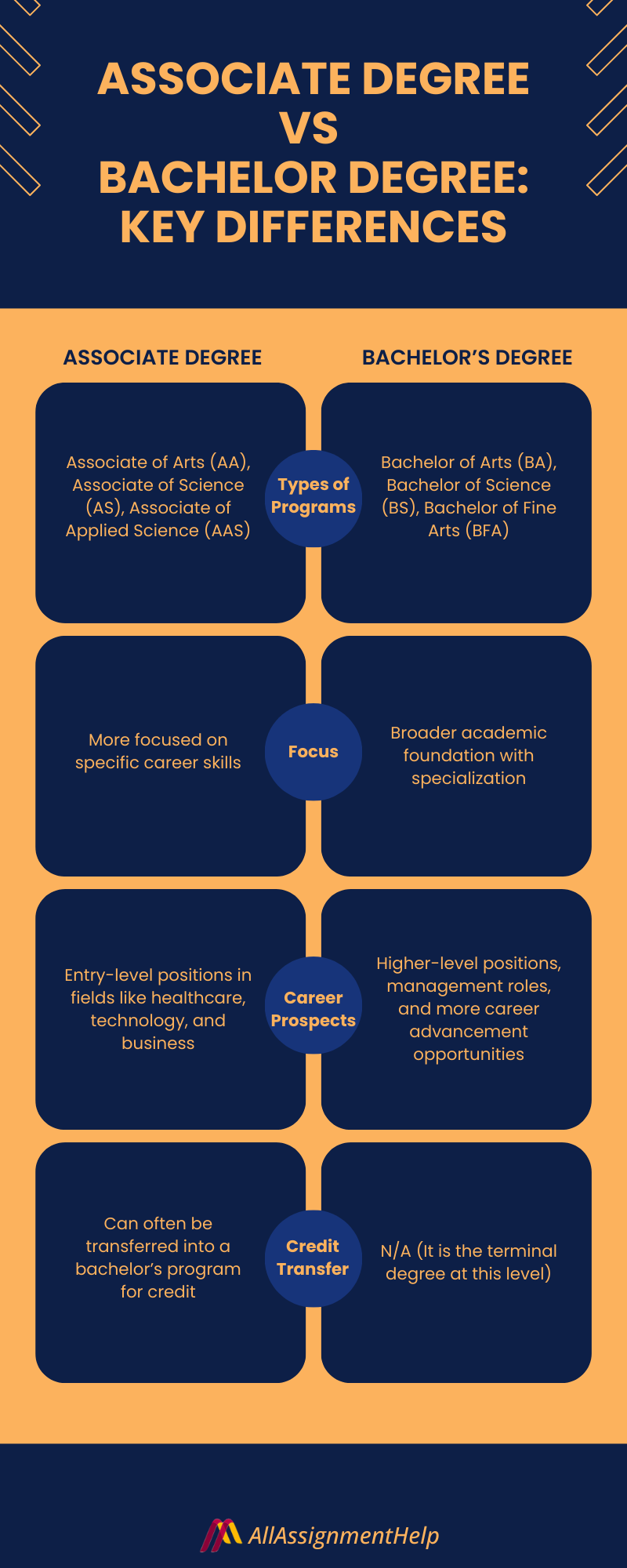Table of Contents
Associate degree vs bachelor degree: which one is better for you? Answering the question, “Which is better?” involves considering your circumstances and career objectives. Although both degree programs have advantages, some of the advantages of an associate’s degree differ from those of a bachelor’s degree.
If you are planning to get a degree, you might wonder if you should get a bachelor’s or associate’s degree. However, it is helpful to know the main difference between an associate’s and a bachelor’s degree before enrolling at a college or university. This blog of All Assignment Help will answer all your questions related to associate degree vs bachelor degree such as how they are different from each other. How are these degrees similar to each other? And ultimately which one should you choose?
So, let’s get started!
What Is an Associate Degree?
An associate degree is mostly provided by technical schools, community colleges, and specific colleges and universities. Its main objective is to provide students with the fundamental understanding and skills in a particular field of study, thereby preparing them for bachelor’s degree-level further education or entry-level jobs in the workforce.
There are different types of associate degrees:
- Associate of Arts
- Associate of Science
- Associate of Applied Arts
- Associate of Applied Science
You might wonder if it is possible to earn an associate degree online. Indeed, a large number of associate degrees are offered online. For example, many students choose to earn an associate degree in nursing primarily online and visit campuses or hospitals mainly for practical training. Also, to help students, there are many online nursing class help services available where you can ask, can you take my online nursing class for me? This reduces the stress of taking multiple online classes simultaneously and provides enough time to focus on other aspects of the online nursing associate course curriculum.
Read Here: Understanding Technical Degrees and Their Benefits
What Is a Bachelor’s Degree?
A bachelor’s degree is an undergraduate educational program that lasts four years and provides a broad understanding of a particular field of study. Students take classes tailored to their majors as well as general education courses. Bachelor’s degrees provide more options for promotion and are often necessary for many professional positions.
A bachelor’s degree requires you to meet several requirements. The main focus of your studies is your major, which you must first choose.
You must have completed high school or equivalent to be admitted into a bachelor’s degree program. A bachelor’s degree program can accept credits from an associate’s program. This means you can be halfway to earning your bachelor’s degree if you finish your two-year associate’s degree.
Now, is it possible to earn a bachelor’s degree online? Yes! There are many online bachelor’s degree programs available that let you save money and offer flexibility. Additionally, you can get online class help from a reliable service provider to complete your online bachelor’s degree with high credits.
Associate Degree vs Bachelor Degree: Key Differences
If you are having trouble deciding between associate degree vs bachelor degree, you must understand the distinctions between the two. It will assist you in making the best choice for yourself. Below we have created an associate degree vs bachelor degree comparison to make your decision easy:

Program Length
Generally, an associate’s degree requires 60 credits to be completed over two years, whereas a bachelor’s degree requires 120 credits spread over four years. Each degree level requires a different amount of coursework. Hence, this accounts for the difference in program length.
Program Focus
Associate’s degree programs provide a more focused curriculum. It focuses more on fundamental knowledge. On the other hand, bachelor’s degree programs offer an expanded education that consists of a curriculum related to the major as well as general education requirements.
Cost
Many students consider cost to be a major consideration when choosing between an associate vs bachelor degree. In general, an Associate of Arts program is less expensive. However, a bachelor’s degree is more expensive. It’s important to consider both the short- and long-term financial effects of each choice.
Earning Potential
The National Center for Education Statistics reports that the average annual wage for a person with a bachelor’s degree is $61,600, while the average annual salary for someone with an associate’s degree is $45,000. An associate’s degree graduates can still find well-paying positions, but bachelor’s degree holders often command better compensation.
Career Opportunities
Not all well-paying positions necessitate a four-year degree. For example, you simply need an associate degree and a license to become a licensed registered nurse. However, a bachelor’s degree gives you access to better-paying jobs. According to Payscale, an associate degree-holding registered nurse earns an average salary of $76,000. RNs can earn an average of $92,000 with a bachelor’s degree in nursing.
Long Term Prospects
Your chances of landing a job with an associate degree are good if you wish to work in stable entry-level roles like hospitals, data centers, architectural firms, or medical clinics. However, a bachelor’s degree is the ideal option if you wish to work in a professional field. This not only makes you eligible for better positions and higher pay, but it also sets you competitively for post-graduate options.
It doesn’t matter whether you pursue an associate degree or a bachelor’s degree, you cannot complete it without the assistance of an online assignment helper. The assignment helper will help you solve tricky assignments and lead you toward high academic performance.
How to Decide Between an Associate Degree and a Bachelor Degree?
A number of specific factors related to your objectives, financial situation, and career goals will influence your decision between associate degree vs bachelor degree. The following are important factors to think about:
Career Goals
A bachelor’s degree is a better option if your chosen career (such as engineering, business management, or teaching) requires advanced knowledge or a bachelor’s degree as a minimum qualification.
However, an associate degree could be enough to begin a job in technical disciplines like IT or electrical technology, or in healthcare like dental hygiene or nursing.
Time Commitment
Since an associate degree often takes two years to complete, you can start working quickly.
In contrast, a bachelor’s degree takes four years to complete. However, it gives a deeper understanding, more employment opportunities, and the possibility for higher long-term earnings.
Cost of Education
Associate degrees are offered by community institutions and have shorter duration. Hence, this degree tends to be less expensive.
Bachelor’s degrees from universities have the potential to increase lifetime earnings. Thus, they can be much more costly.
Flexibility and Transfer Options
If you are not sure, you can begin with an Associate Degree and then transfer credits to a Bachelor’s Degree program. This strategy saves money and lets you try things out before committing to four years.
No matter which subject you are choosing to switch to in a bachelor’s degree program, you can always find affordable assignment help services online. Be you are looking for economics assignment help, history assignment help, accounting assignment help, or any other, you will find multiple services available to help you earn your bachelor’s degree smoothly.
Job Market and Earnings Prospects
Learn about the significance of each degree by researching your industry. For example, some fields highly reward Bachelor’s Degrees, while others place more value on practical experience and certifications, making an Associate Degree a viable option.
According to statistics, people with bachelor’s degrees usually make more money each year than people with associate’s degrees.
Also Read: Most Useful University Degree for the Walk of Your Life
Associate Degree vs. Bachelor Degree: Which One Is Better for You?
Both a bachelor’s degree and an associate’s degree are great options, and each has unique advantages based on your academic objectives, professional goals, and particular circumstances. It is crucial to think about your long-term goals and the amount of dedication you are prepared to put in while choosing between the two. Spend time researching and comparing programs, assessing their advantages and disadvantages. The ideal option is ultimately the one that fits your goals, passions, and financial resources.
Also, if you have already enrolled yourself in any of these two degrees and need help with your assignments, you can visit our website to hire a subject expert. We have experts available for academic subjects. We can provide you with psychology assignment help, law assignment help, English assignment help, and so forth. Just name the subject, and we have got you covered with all your academic needs of writing.
FAQs
| What are the differences between an associate’s and a bachelor’s degree in terms of study depth? While associate’s degrees are more focused and practical, bachelor’s degrees offer a deeper, more theoretical study in a chosen field, along with more extensive coursework and research opportunities. |
| What are the drawbacks of earning an associate’s degree? An associate’s degree has drawbacks, such as less job chances in specific fields, possibly lower earning potential, and fewer possibilities for career growth when compared to a bachelor’s degree. |
| Is it possible to get a bachelor’s degree before an associate’s degree? Yes. A bachelor’s degree can be earned either before or after an associate’s degree. Although it is rare, if you wish to gain more skills or certification after earning a bachelor’s degree, you could return to school to receive an associate’s degree. |
